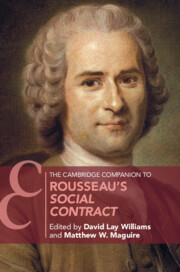Book contents
- The Cambridge Companion to Rousseau’s Social Contract
- Series page
- The Cambridge Companion to Rousseau’s Social Contract
- Copyright page
- Dedication
- Contents
- Contributors
- Acknowledgments
- 1 Introduction
- 2 “Every Legitimate Government Is Republican”
- 3 What If There Is No Legislator?
- 4 Rousseau’s Republican Citizenship
- 5 Rousseau’s Negative Liberty
- 6 Rousseau’s Ancient Ends of Legislation
- 7 Property and Possession in Rousseau’s Social Contract
- 8 Political Equality among Unequals
- 9 On the Primacy of Peoplehood
- 10 Rousseau on Voting and Electoral Laws
- 11 On the Possibility of a Modern Republic
- 12 Rousseau’s Case against Democracy
- 13 Rousseau’s Dilemma, or “Of Civil Religion”
- 14 Entreating the Political
- 15 Civil Religion and Political Unity
- Bibliography
- Index
- Series page
2 - “Every Legitimate Government Is Republican”
Rousseau’s Debt to and Departure from Montesquieu on Republicanism
Published online by Cambridge University Press: 28 March 2024
- The Cambridge Companion to Rousseau’s Social Contract
- Series page
- The Cambridge Companion to Rousseau’s Social Contract
- Copyright page
- Dedication
- Contents
- Contributors
- Acknowledgments
- 1 Introduction
- 2 “Every Legitimate Government Is Republican”
- 3 What If There Is No Legislator?
- 4 Rousseau’s Republican Citizenship
- 5 Rousseau’s Negative Liberty
- 6 Rousseau’s Ancient Ends of Legislation
- 7 Property and Possession in Rousseau’s Social Contract
- 8 Political Equality among Unequals
- 9 On the Primacy of Peoplehood
- 10 Rousseau on Voting and Electoral Laws
- 11 On the Possibility of a Modern Republic
- 12 Rousseau’s Case against Democracy
- 13 Rousseau’s Dilemma, or “Of Civil Religion”
- 14 Entreating the Political
- 15 Civil Religion and Political Unity
- Bibliography
- Index
- Series page
Summary
When Rousseau published the Social Contract in 1762, there was no more illustrious authority on politics than Montesquieu. Rousseau draws on Montesquieu’s discussion of republics, but his departures from his predecessor are even more important. Notably, he criticizes Montesquieu for not seeing that the sovereign authority is the same in all states and that “Every legitimate government is republican.” The chapter begins with Montesquieu’s treatment of republics in the Spirit of the Laws to identify the features of classical republicanism that attracted Rousseau and also to reveal Montesquieu’s ambivalence about these ancient models. It then turns to Rousseau’s endeavor to revive republicanism by putting it on a new basis of the principles of political right.
- Type
- Chapter
- Information
- The Cambridge Companion to Rousseau's Social Contract , pp. 10 - 39Publisher: Cambridge University PressPrint publication year: 2024

